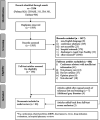A realist synthesis of pharmacist-conducted medication reviews in primary care after leaving hospital: what works for whom and why?
- PMID: 33127835
- PMCID: PMC8070649
- DOI: 10.1136/bmjqs-2020-011418
A realist synthesis of pharmacist-conducted medication reviews in primary care after leaving hospital: what works for whom and why?
Abstract
Background: Medication reviews for people transitioning from one healthcare setting to another potentially improve health outcomes, although evidence for outcome benefits varies. It is unclear when and why medication reviews performed by pharmacists in primary care for people who return from hospital to the community lead to beneficial outcomes.
Objective: A realist synthesis was undertaken to develop a theory of what works, for whom, why and under which circumstances when pharmacists conduct medication reviews in primary care for people leaving hospital.
Methods: The realist synthesis was performed in accordance with Realist And MEta-narrative Evidence Syntheses: Evolving Standards reporting standards. An initial programme theory informed a systematic literature search of databases (PubMed, Embase, Cumulative Index of Nursing and Allied Health Literature, International Pharmaceutical Abstracts, OpenGrey, Trove), augmented by agency and government sources of information. Documents were synthesised by exploring interactions between contexts, intervention, outcomes and causal mechanisms.
Results: The synthesis identified 9 contexts in which 10 mechanisms can be activated to influence outcomes of pharmacist medication reviews conducted in primary care postdischarge. For a medication review to take place these include trust patients have in healthcare professionals, their healthcare priorities postdischarge, capacity to participate, perceptions of benefit and effort, and awareness required by all involved. For the medication review process, mechanisms which issue an invitation to collaborate between healthcare professionals, enable pharmacists employing clinical skills and taking responsibility for medication review outcomes were linked to more positive outcomes for patients.
Conclusions: Medication reviews after hospital discharge seem to work successfully when conducted according to patient preferences, programmes promote coordination and collaboration between healthcare professionals and establish trust, and pharmacists take responsibility for outcomes. Findings of this realist synthesis can inform postdischarge medication review service models.
Keywords: health services research; healthcare quality improvement; medication reconciliation; pharmacists; transitions in care.
© Author(s) (or their employer(s)) 2020. Re-use permitted under CC BY-NC. No commercial re-use. See rights and permissions. Published by BMJ.
Conflict of interest statement
Competing interests: None declared.
Figures
References
-
- National Institute for Health and Care Excellence . Medicines optimisation: the safe and effective use of medicines to enable the best possible outcomes (NG5), 2015. Available: https://www.nice.org.uk/guidance/ng5 [Accessed 20 Apr 2020]. - PubMed
-
- Australian Commission for Safety and Quality in Health Care . Medication safety standard. Available: https://www.safetyandquality.gov.au/standards/nsqhs-standards/medication... [Accessed 20 Apr 2020].
Publication types
LinkOut - more resources
Full Text Sources


